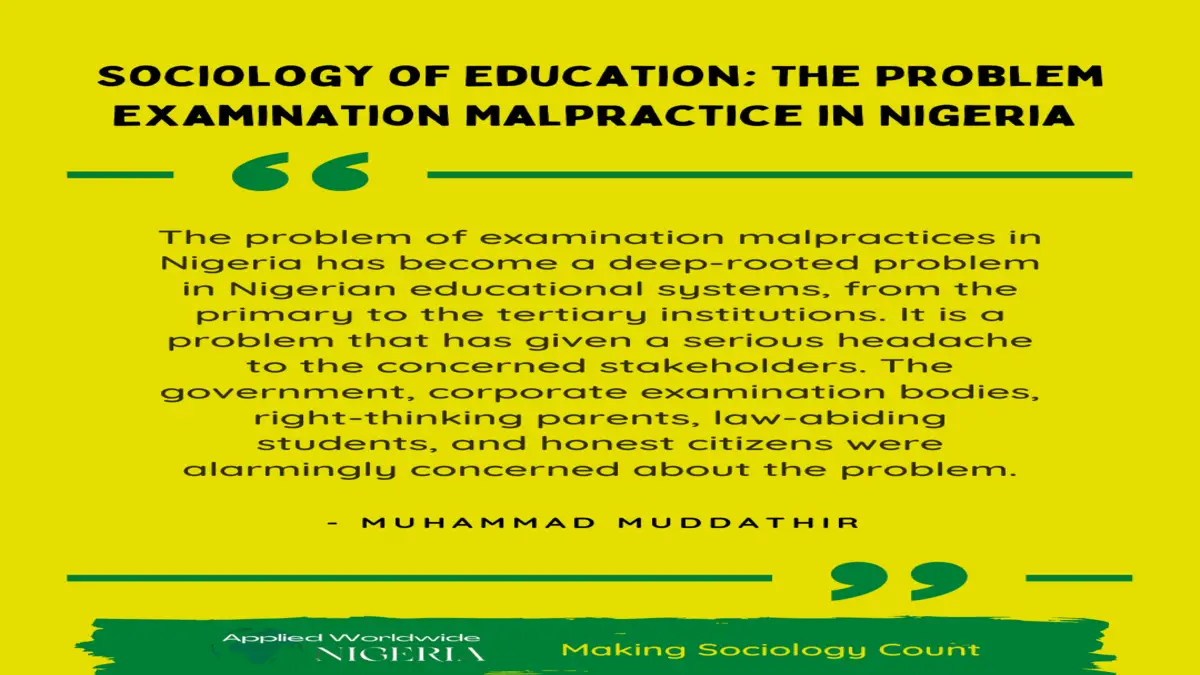Sociology of education will assist in dissolving social vices and unrest bedeviling our society today by inseminating our children with the right values and norms, by helping them shun examination malpractice in Nigeria.

Sociology, took as its primary focus, the study of man in a group context to underscore the need for group dynamics in understanding the total social system. The act of sociology as a discipline is a direct phenomenon of the insufficiency of earlier branches. A discipline that studies education sociologically, with the premise that it recognizes education as a social fact, a process, and an institution, having a social function and being determined socially.
Problem of Examination Malpractice in Nigeria
The problem of examination malpractices in Nigeria has become a deep-rooted problem in Nigerian educational systems, from the primary to the tertiary institutions. It is a problem that has given a serious headache to the concerned stakeholders. The government, corporate examination bodies, right-thinking parents, law-abiding students, and honest citizens were alarmingly concerned about the problem.
There are many reasons that push our society into examination malpractices, which include a decline in reading culture among students, and improper preparations for examinations, as the majority of students nowadays don’t prepare for examinations. They walk into their examination hall empty-headed and expect God to do magic for them. When they find out that they can not pass the examination on their own, they will resort to examination malpractice as that is their only option. Teachers-related factors such as poor teaching methods, laziness, teacher’s unfriendliness, and other societal factors. Besides, corruption plays a notable role in examination malpractices. These resulted in the rate at which Nigeria recorded massive failure, especially in the West African Examination Council (WAEC) and National Examination Council (NECO).
The reason why many students cheat during examinations is because of the failed education system of the country. In Nigeria today, many students have come to understand that they are wasting their time studying because it’s not going to pay off at the end of the day. That is why many Nigerian students now are engaged in a lot of online scams. Some pay more attention to making money through bitcoin and other businesses than their education. This is a very giant problem and it is one of the major causes of malpractice in the educational sector.
We can overcome the social problem of examination malpractices by enlivening the reading culture, organizing workshops and counseling programs, parents-teachers training and child development workshops, and free book donations to schools. However, government and non-governmental organizations should actively volunteer to host students in schools across the country, to enlighten them on the importance of imbibing the culture of reading, this will help in making students brilliant ones.
Government should increase teacher salaries and there will be fewer cases of examination malpractice in Nigeria. With this many teachers have expressed the opinion that one of the tentative ways through which examination malpractice can be tackled in Nigeria is by increasing teachers’ salaries. It will really go a long way in curbing examination malpractice in this country.
Government should create a sincere collaboration with other agencies to empower teachers, support funding in the education sector, promote campaigns, and organize seminars on the dangers of examination malpractices and special welfare packages for examination officials.
Students have been driven away from social media platforms from studying, this should be discouraged, and they should be redirected to the path of being books friendly, as well as imbibing the culture of reading.
The problems were highlighted, and possible remedy outlined. The study recommended among others, that: Government, parents, teachers, and policy-makers should as a matter of urgency put more effort into creating educational policies for the betterment of the child and society at large.







